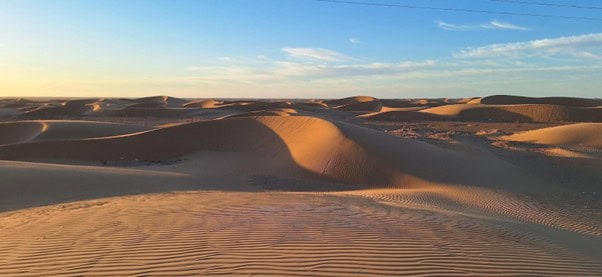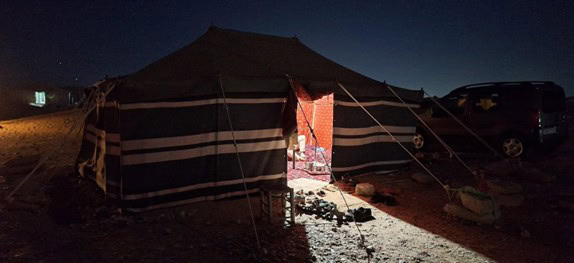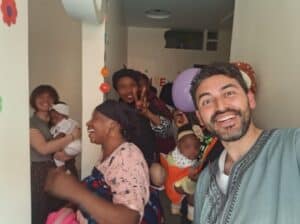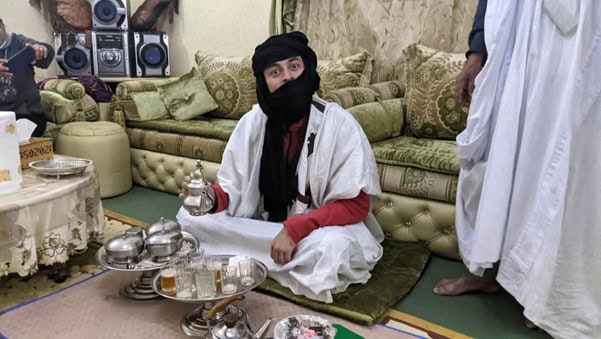On May 18, 2024, a month before the end of my two years of regency in Morocco, I participated in my last tea ritual among the beautiful dunes of the Sahara. A ritual that began about forty minutes before when we all went out to contemplate the sunset that soothes the heart, the colorful sky that leaves the spirit deeply in awe, and that vast desert full of dunes that reminds us of our smallness.

My last Tea Ritual
The tea ritual took place inside a “jaima” (a tent used by nomadic peoples in the Sahara Desert) that was adorned with colorful fabrics and Moroccan sofas. Participating in this beautiful experience are the team of volunteers of Caritas Laayoune and some of their families, a Saharawi friend (name given to the people of this region), and two visiting Jesuit friends. We are 11 people crammed into the colorful tent.
 The tea ritual is done by our Saharawi friend. He patiently measures the amount of tea in his hand according to the number of people present and puts it in the teapot while the charcoal burns next to him. He stops to chat for a bit, then goes on to put the kettle on the charcoal, and immediately goes on telling more stories and anecdotes. We spend some time chatting as the tea reaches its boiling point. He adds sugar and while he continues talking, he mixes it by pouring it into the tea glasses and returning it to the teapot. Finally, the first round of tea is ready and served with precision for each person inside the tent. The first round of tea out of three has been a success, now we go with the second round.
The tea ritual is done by our Saharawi friend. He patiently measures the amount of tea in his hand according to the number of people present and puts it in the teapot while the charcoal burns next to him. He stops to chat for a bit, then goes on to put the kettle on the charcoal, and immediately goes on telling more stories and anecdotes. We spend some time chatting as the tea reaches its boiling point. He adds sugar and while he continues talking, he mixes it by pouring it into the tea glasses and returning it to the teapot. Finally, the first round of tea is ready and served with precision for each person inside the tent. The first round of tea out of three has been a success, now we go with the second round.
It is during the second round that the great significance of this ritual is discussed. One of the volunteers remembers a tourist phrase about these three rounds of tea that says: “the first is bitter as life, the second sweet as love and the third soft as death.” On hearing this phrase, my Jesuit friend shares with us another phrase that a friend from the Middle East taught him years ago. He was told that for the tea ritual, three things are necessary: “charcoal, company and letting time pass” (Jimar, Jama3, Jar).
All these ingredients are the perfect metaphor to talk about the experiences I lived and shared with all those I have met in these two years. Shared experiences that have been sometimes refreshing, sweet and bitter and that have marked and transformed my heart and way of seeing the world. Experiences that burn and scorch the depths of your heart as you approach them.
CHARCOAL
The ingredients for tea are green tea, water and sugar, but to get the desired drink these ingredients must be put in a teapot and subjected to the heat of the burning charcoal.
In my first year, in the city of Nador in northern Morocco, I was introduced to these hard experiences through the Diocesan Delegation of Migrations where I lent an ear and heart to so many sub-Saharan sisters and brothers that have made it to this part of the continent; and the Baraka Center where I taught the Spanish language to Moroccan men and women at risk of social exclusion and accompanied the work team. In my second year it was through Caritas Apostolic Prefecture of the Sahara where I acted as its coordinator. These are the three teapots that brought me closer to the realities that burn and scorch the lives of so many people, men, women and children in a situation of mobility or at risk of emigrating due to the harsh living conditions they must face every day.
Some of these realities include wars, poverty, gender-based violence and climate change, to name a few. These realities have marked the lives of people in situation of mobility in their countries of origin and on the transit routes, that of their families and those who have accompanied them. Realities that include the many lives that are consumed to death, such as the already more than “5,054 people [who] have died on the Western Euro-African Border in the first 5 months of 2024“.
In a very particular way, I have been touched and deeply marked by the experiences shared by so many women who, seeking a better living condition for themselves and their children, cross and endure this fiery crucible of migration in a world that treats them with indifference and anonymity, but they still continue to move with resiliency without losing hope.
I must point out that it has been in this getting closer to the burning charcoal that encounters have arisen and a tea has emerged, which for an instant has sweetened the surrounding time and space. These have been moments of hope where indifference and anonymity have been put aside and what remains is the brewing of a relationship cultivated and accompanied, with humanity, dignity. Something that cannot be told but experienced and shared.
COMPANY
During my last year I came to realize that the tea ritual is not about the tea because it is incomplete without the company. There were two beautiful surprises that showed me a new way to accompany as I was being accompanied.
 One of the surprises for me was the new model of being Church that accompanied me. Christians in Morocco form less than 1%, and the Catholic church forms part of that percentage. A church that is formed by foreign students, lay people who live in Morocco temporarily, but its main body is are the many religious men and women from the many religious congregations that are missioned here. These religious men and women give their lives for the least in a stealthy and silent way. I was deeply impacted by the unity and support among different religious orders. One encounter a united religious community that is trying its best to bring about the kingdom of God with their way of being church.
One of the surprises for me was the new model of being Church that accompanied me. Christians in Morocco form less than 1%, and the Catholic church forms part of that percentage. A church that is formed by foreign students, lay people who live in Morocco temporarily, but its main body is are the many religious men and women from the many religious congregations that are missioned here. These religious men and women give their lives for the least in a stealthy and silent way. I was deeply impacted by the unity and support among different religious orders. One encounter a united religious community that is trying its best to bring about the kingdom of God with their way of being church.
The second surprise that has deeply impacted me has been the amazing collaborations with Muslim sisters and brothers. I made friendships that have been born, as Pope Francis mentions in his letter Fratelli Tutti, in a “culture of encounter… [where we] should be passionate about meeting others, seeking points of contact, building bridges, planning a project that includes everyone.” I experience encounter as a lifestyle. This was my first time truly entering into dialogue with Muslims and working shoulder to shoulder with them with the aim to provide a little more dignity to the most vulnerable and forgotten by societies. This was not only surprising but this beautiful experience, where I lived and breathed in their faith, has planted a new seed in my heart as I continue my Jesuit formation.
So, all my gratitude goes to everyone that has accompanied me during these two years. In particular, to all the countless sub-Saharan African men, women and children, and the Moroccan women and young people in Nador, who enlarged my heart by opening their hearts to me. From the depths of my heart I say to you, شكراً (thank you).
TIME
Finally, and very important in the tea ritual, is time. A great lesson of the Moroccan people has been to conceive a new notion of time. Put the watch aside and let time be what it is. To be completely surrendered to the present moment with all my resistances.
Two phrases remained very present in my heart and have to do with surrendering to time. One is the constant “Inshallah” (perhaps better known as the Spanish ojala – if God wills) that is used constantly throughout the day. To leave worries aside and let things happen in God’s time without having expectations at the beginning or the end.
Which brings me to the second phrase “FYEDD ALLAH” or “into the hands of God”. A phrase I heard from Moroccan women in the northern region of Morocco, where they taught me to remain in an eternal trust to providence. A phrase that accompanied me throughout my second year of regency in an exercise of continuous abandonment in the arms of the Father when uncertainty overwhelmed me or when things happened at the least opportune time.
Towards a Tea Pastoral Care
Without a doubt, these are expressions of time, faith, and life that have helped me cultivate the virtue of patience. A virtue that I wish to continue cultivating and developing in the paths that the Spirit of the Lord wants to lead me, particularly in my studies of Theology that will begin this coming September.
In my heart are planted the seeds that have been sown by all those who have accompanied me in these two years and knowing that everything is in God’s hands, I maintain the desire that one day I will return to these lands that have given me so much.
For now, I carry with me the mission of creating new ‘jaimas’ to share the tea ritual, or rather, a tea pastoral care where we are present when we become less afraid to approach the charcoal surrounding the life experiences of those we meet in our lives and let the tea appear as we hold those moments; enjoying the company of the moment without any expectation and thus being able to provide an attentive ear and heart to the shared treasures; and letting time pass with patience and freedom since these can be the encounters that give dignity and mark a sincere relationship.
Until the next tea ritual, Inshallah!

(Photos courtesy of author)
The post A Tea Ritual in Morocco: A Reflection of Formation in Patience appeared first on The Jesuit Post.